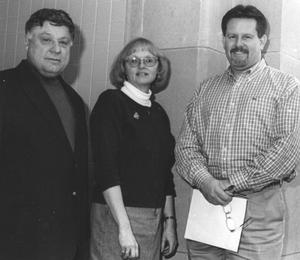Professors want to share, hear ideas on rural concerns

When college faculty members attend conferences, they often return full of new information and ideas. After three Chadron State education professors attended the annual meeting of the Association of Teacher Educators in Dallas this winter, they had an idea they hope to implement: They plan to organize an auxiliary body within the association made up of faculty from similar colleges with similar concerns.
The three—Drs. Jack Hytrek, Patti Blundell and Don King—weren’t upset by the proceedings at the conference, but they noted that most of the topics at the various sessions were designed for larger institutions in more densely populated areas. That’s to be expected because there are more such institutions with more faculty to attend such events.
But the small, rural colleges have interests, problems and questions that need addressed. A session or two to discuss those issues would be a plus.
“Largely because of our location, we have concerns that the colleges and universities in the metropolitan areas don’t have,” said Hytrek. “Low population, low income and distances are common problems for most schools located in rural areas. We hope to organize a special group within the association so we can get together annually and discuss these and other topics that are mutual concerns.”
Somewhat unwittingly, the Chadron State trio may have started the auxiliary body at the meeting in Dallas. At the invitation of the association, they presented a panel discussion titled “Small Rural Colleges/Universities: How Do We Meet NCATE Requirements Plus the Challenges of Today’s National and State Standards and Goals.”
The panel topic was a natural because the CSC Education Department is facing these exact challenges this spring. It is preparing for a re-accreditation visit from the National Council for Accreditation of Teacher Education and also encountering an array of new circumstances brought on largely by the No Child Left Behind mandate.
The session attracted faculty from at least 10 institutions ranging from North Dakota to Mississippi and including those from densely populated states such as Ohio and Illinois who still consider their colleges to be rural in nature.
Hytrek, Blundell and King discussed topics such as providing certification programs at off-campus sites, assisting with alternative certification, recruiting and retaining qualified faculty, and the impact of budget constraints on meeting state and national standards.
“We learned that a number of our concerns are also concerns at many other schools,” Hytrek said. “It helps to discuss these items and learn how others are handling them. Chadron State has a super reputation for training teachers. We’ve been able to adapt to our situation well and we’re glad to share our expertise. We also like to hear others’ ideas and explore new methods that will strengthen our programs. That’s why we’re exploring the possibility for forming a new organization within the association. It will be a vehicle that will help us analyze what we’re doing.”
Hytrek said he’s already been in touch with faculty from most of the institutions that attended the CSC group’s panel discussion, and has received several favorable responses to the trio’s proposal.
Hytrek, who is the college’s director of student teaching, said he’s recently encountered a couple of new challenges. One is consolidation of schools, which reduces the sites available for CSC education majors to do field experiences such as observation and participation and student teaching, the capstone activity when they are seniors.
In addition, Hytrek said the new No Child Left Behind legislation can limit opportunities for placing student teachers. He said a school in Wyoming would not accept a student teacher for the fourth grade this spring because the students were going to spend much of the semester studying for the tests they are required to take because of the federal mandate.
Next year’s Association of Teacher Educators annual meeting will be in Chicago. Hyrek said he anticipates faculty for numerous “rural” colleges, no matter where they are located, will get together to discuss challenges and possible solutions even if the separate auxiliary organization isn’t operating at full capacity.
Category: Campus News, Employee Awards & Achievements
